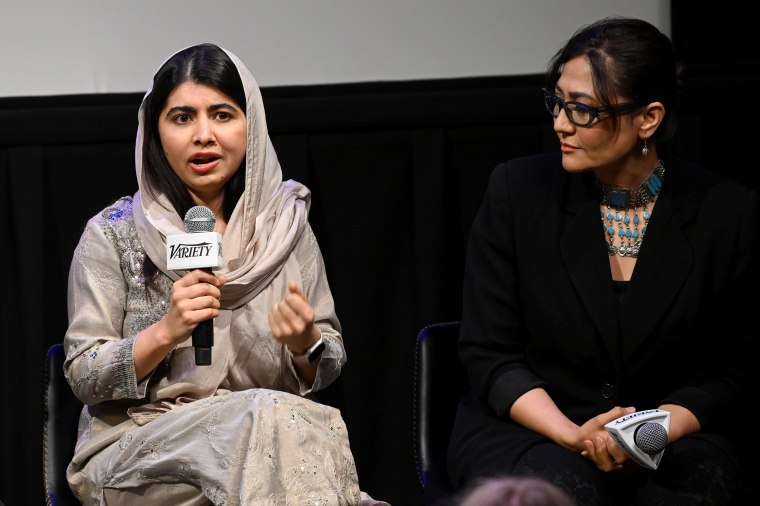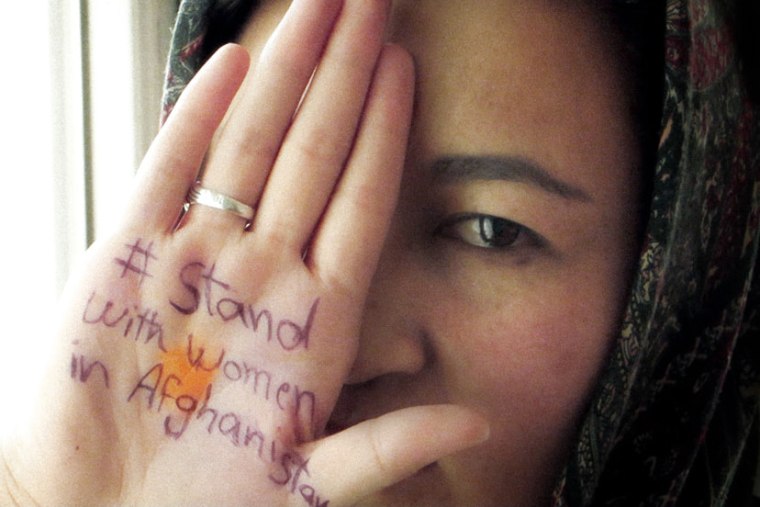Twelve years after being shot in the face and almost killed by the Taliban for daring to champion girls’ eduction in her home country of Pakistan, Malala Yousafzai is warning of the dangers that the group’s extreme version of Islam poses to women.
The Nobel Peace Prize winner is among the producers of “Bread & Roses,” a new documentary from director Sahra Mani about women in Afghanistan after the Taliban takeover in 2021. The film, which debuts on Apple TV+ on Friday, follows three women — government employee Sharifa Mowahedzada, dentist Zahra Mohammadi and activist Taranom Seyedi — as they try to fight the oppressive laws being imposed on them by the Taliban.
“At this time, it’s extremely important that we bring the voices of Afghan women forward,” Yousafzai said in a Zoom interview with NBC News.
The 27-year-old activist has become a global icon for girls’ education since 2012, when she was shot on her way home from school in Pakistan’s Swat Valley area. (The militant group Tehreek-e-Taliban Pakistanalso known as the Pakistani Talibanis a separate organization from the Taliban in Afghanistan, but a close ally.)
“The Taliban are attempting to make women invisible, in a way,” said Yousafzai, who graduated from Oxford University in 2020. “So, visibility to the stories of women is so crucial, and this documentary is doing exactly that.”
The documentary largely uses cellphone footage captured by the women themselves to showcase what it’s like as the Taliban cracks down on their freedoms, including the ability to work, appear in public without a male chaperone or receive an education.

In 2001, American-backed forces toppled the Taliban, which had sheltered Osama bin Laden, the Al Qaeda founder and orchestrator of the 9/11 attacks. Nearly 20 years later, after Taliban militants overran much of the country, the group signed a peace deal with the US during President-elect Donald Trump’s first term that included the withdrawal of all foreign troops from Afghanistan by May 2021.
President Joe Biden extended the deadline to August 2021 and upheld the agreement. But the withdrawal — which was marked by violence, terror attacks and scenes of desperate Afghans trying to leave the country — has been criticized for being badly managed.
After the Taliban swept back into powerthe group began imposing its extremely conservative version of Islam on the population. Women have been barred from most areas of public life. The Taliban has forbidden women from praying loudly or reciting the Quran in front of other women, issued a ban on women’s voices and bare faces in public and closed classrooms to girls from the sixth grade on.
Mani, who also serves as a producer, said she was working on a different documentary in Afghanistan when the Taliban takeover happened. That’s when she ended up shifting gears and working with a charity to help women with urgent needs.

“That’s how I met so many women who were sharing their daily life with me and recording their daily activities,” she said during a Zoom interview. “When they went to demonstrate in the street, they kept sending me videos. I decided to make an archive out of all those videos.”
With support from Oscar-winning actor Jennifer Lawrence, Mani said the archival footage became the foundation for a feature documentary. Lawrence, who also serves as a producer on the film alongside Justine Ciarrocchi, said she felt the documentary’s themes were relevant to people beyond Afghanistan.
“There is not much separating us from these other countries,” Lawrence told Variety ahead of the documentary’s debut at the 2023 Cannes Film Festival. “Democracy is all we have, and it’s sliding back. We have to keep our eye on the ball, which is individual freedoms.”
Throughout “Bread & Roses,” Afghan women are seen protesting in the streets, screaming “Down with terrorists!” and demanding women still be allowed to learn. A frequent chant, written on many of their signs, reads: “Work, bread, education!”
Footage from the documentary shows groups of women organizing in Mohammadi’s former dental practice, where they eat, chat and craft protest signs and demonstration plans.
The film also shows the dangers of such resistance. Mowahedzada, one of the film’s main subjects, documents her loneliness after having to flee Afghanistan for her safety.
“May history remember that once upon a time such cruelty was permitted against the women of Afghanistan,” she says at one point in the documentary, adding: “Before the world, before countries that denounce coldheartedness and cry for democracy, Afghan women have become victims of politics everywhere. For me, there is no choice but to flee.”
Mowahedzada, the former government employee, often films herself from the confines of her home, where she showcases her isolation after she’s forbidden from working.
“I miss everything I had,” she says in the film. “We don’t have the right to work. We don’t have the right to study. Everything has been taken from me.”
In July, the Taliban’s chief spokesman, Zabihullah Mujahid, spoke at a United Nations-led meeting in Qatar, in which he urged Western leaders to look past harsh laws imposed on Afghan women and girls, The Associated Press reported.
He said the Taliban upholds certain religious and cultural values that “must be acknowledged” to facilitate progressive bilateral relations.
But human rights organizations and activists like Yousafzai have encouraged global leaders not to turn away from what is happening to women in the country. Since taking power in Afghanistan in 2021, the Taliban has “created the world’s most serious women’s rights crisis,” according to an August news release from Human Rights Watch.
(The documentary) is showing you only a glimpse of how these women are treated for simply going out for a peaceful demonstration to ask for their right to work and for education.
-Malala Yousafzai
“Under the Taliban’s abusive rule, Afghan women and girls are living their worst nightmares,” Fereshta Abbasi, Afghanistan researcher at Human Rights Watch, said in the news release. “All governments should support efforts to hold the Taliban leadership and all those responsible for serious crimes in Afghanistan to account.”
Both Yousafzai and Mani said the situation has only worsened in the three years since filming for “Bread & Roses” took place.
The documentary “is showing you only a glimpse of how these women are treated for simply going out for a peaceful demonstration to ask for their right to work and for education,” added Yousafzai, who through her nonprofit the Malala Fund has spent years advocating for women’s right to education.
“It’s important that countries do not normalize relations with the Taliban, because they are becoming complicit in the oppression that the Taliban are imposing on women and girls,” she added. “We need women’s demands and rights to be on the agenda where the future of Afghanistan is being discussed and decided.
She called on global leaders to codify gender apartheid as a crime against humanity under international criminal law so that “we can end it, challenge it and hold perpetrators like the Taliban accountable for systematically erasing and oppressing women.”
When asked what she hopes audiences take away from the film, Mani echoed Yousafzai’s message.
“Afghan women are paying a high price,” she said. “But it’s really an alarm for all of us to think deeply about these issues.”

